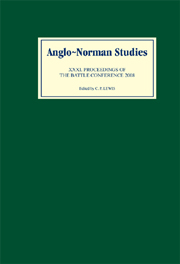Book contents
- Frontmatter
- Contents
- LIST OF ILLUSTRATIONS, MAPS, AND TABLES
- EDITOR'S PREFACE
- ABBREVIATIONS
- Kingship, Lordship, and Community in Eleventh-Century England (R. Allen Brown Memorial Lecture)
- Citadels of God: Monasteries, Violence, and the Struggle for Power in Northern England, 1135–1154
- Writing Civil War in Henry of Huntingdon's Historia Anglorum
- Land, Family, and Depredation: The Case of St Benet of Holme's Manor of Little Melton
- Brothers at Court: Urse de Abetot and Robert Dispenser
- Gerald of Wales and the Prophet Merlin
- The First Hundred Years of the Abbey of Tiron: Institutionalizing the Reform of the Forest Hermits
- All Roads Lead to Chartres: The House of Blois, the Papacy, and the Anglo-Norman Succession of 1135
- The Vita Ædwardi: The Politics of Poetry at Wilton Abbey
- William of Malmesbury, King Henry I, and the Gesta Regum Anglorum
- Twelfth-Century Receptions of a Text: Anglo-Norman Historians and Hegesippus
- LIST OF CONTENTS OF VOLUMES 1–30
Twelfth-Century Receptions of a Text: Anglo-Norman Historians and Hegesippus
Published online by Cambridge University Press: 12 September 2012
- Frontmatter
- Contents
- LIST OF ILLUSTRATIONS, MAPS, AND TABLES
- EDITOR'S PREFACE
- ABBREVIATIONS
- Kingship, Lordship, and Community in Eleventh-Century England (R. Allen Brown Memorial Lecture)
- Citadels of God: Monasteries, Violence, and the Struggle for Power in Northern England, 1135–1154
- Writing Civil War in Henry of Huntingdon's Historia Anglorum
- Land, Family, and Depredation: The Case of St Benet of Holme's Manor of Little Melton
- Brothers at Court: Urse de Abetot and Robert Dispenser
- Gerald of Wales and the Prophet Merlin
- The First Hundred Years of the Abbey of Tiron: Institutionalizing the Reform of the Forest Hermits
- All Roads Lead to Chartres: The House of Blois, the Papacy, and the Anglo-Norman Succession of 1135
- The Vita Ædwardi: The Politics of Poetry at Wilton Abbey
- William of Malmesbury, King Henry I, and the Gesta Regum Anglorum
- Twelfth-Century Receptions of a Text: Anglo-Norman Historians and Hegesippus
- LIST OF CONTENTS OF VOLUMES 1–30
Summary
Under the name Hegesippus there has come down to us a Latin translation of Josephus' Jewish War in five books, probably made in the later fourth century. The precise identity of its author remains unclear. From Late Antiquity onwards the translation was variously but falsely attributed to Jerome, Rufinus, or St Ambrose of Milan, but it is more probably the work of a Jewish convert. Although Hegesippus' History usually receives scant attention today, the work had much to recommend it to readers in the Middle Ages. First it is closely allied to the Bible narrative, relating the events which led to the destruction of Jerusalem by Titus, with an introductory summary of Jewish history from the time of Judas Maccabeus. Moreover, its author injects a strong moral tone, seeing the sack as inevitable retribution for Christ's crucifixion. In addition to the work's close relationship to biblical history and its Christian outlook, it also tells a gripping story full of vivid narrative, effective speeches, horrific incidents, and grisly detail, couched in stylish Latin often reminiscent of Sallust and Virgil. All of this meant that Hegesippus had a wide circulation and was well known to medieval readers. Because of its popularity, much work remains to be done on the influence of this now neglected text. Here I propose to concentrate on one particular aspect of its reception, namely the effect the work had on four Anglo-Norman historians in the twelfth century.
- Type
- Chapter
- Information
- Anglo-Norman Studies 31Proceedings of the Battle Conference 2008, pp. 177 - 196Publisher: Boydell & BrewerPrint publication year: 2009



